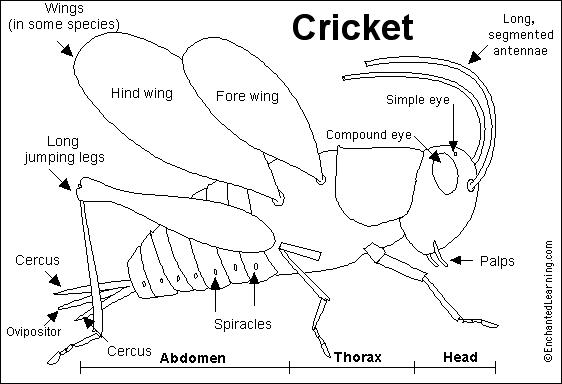
 |
| You might also like: | Label Cricket Anatomy Printout | Cicada Label Me! Printout | Harlequin Bug Printout | The Mitten, A Printable Book: Cricket Page | Wasp Printout | Today's featured page: Label Dinosaurs Printout |
| Insect Printouts Go to a cricket printout |
Cricket |
Animal Printouts Label Me! Printouts |


Anatomy: Like all insects, crickets have a three-part body (head, thorax and abdomen), six jointed legs, and two antennae. Their body is covered with a hard exoskeleton. Crickets breathe through a series of holes called spiracles; they are located along the sides of the body. Crickets are brown or black. Crickets are very similar to grasshoppers, but the cricket's antennae are very long, the wings are held flat over the body, and the ovipositor is very long. Not all crickets have wings. Crickets sense sounds using tympani (hearing organs) located in their front legs.
Metamorphosis: Crickets undergo incomplete metamorphosis. They hatch from eggs that the female deposits in soil (or plant material) using her ovipositor. Immature crickets (called nymphs) look like small adults, but the wings and ovipositor (of the female) are not fully developed. They molt many times as they develop into adults.
Diet and Predators: Crickets are omnivores (they eat both plants and animals). They scavenge dead insects and eat decaying material, fungi and young plants. Their predators include birds, rodents, reptiles, other insects (including beetles and wasps), and spiders.
Classification: Kingdom Animalia (animals), Phylum Arthropoda (arthropods), Class Insecta (insects), Order Orthoptera (crickets, grasshoppers, etc.), Suborder Ensifera, Family Gryllidae (crickets), Genera Acheta, Gryllus, Oceanthus, Myrmecophila, many species.
| Search the Enchanted Learning website for: |